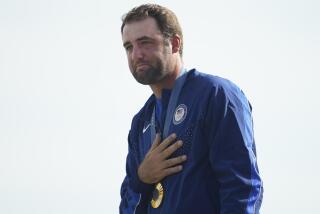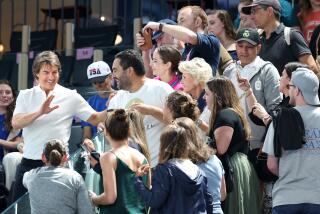Aussies Discover a New Favorite Son
- Share via
A truism from the land that embodies the Winter Olympics’ newest trivia question: We Australians love our international heroes as only an isolated island nation of 18 million can.
When he wins another Academy Award, or another Golden Globe, or becomes the object of affection of another smitten and beautiful co-star, he is Australia’s Russell Crowe. When there is trouble in a bar; when Meg Ryan goes home crying; when his latest epic turns out to be a dud, he is New Zealand-born Russell Crowe.
So it would have been, up until the final seconds of the Winter Olympic men’s short-track 1,000-meter skating final at the Salt Lake Ice Center Saturday night. Brisbane’s Steven Bradbury was a gallant fifth in his last race in Olympic competition, so far off the pace he was barely in the same camera frame; his parents got to see him in the country’s colors with the five interlocking rings for the first time, and everyone would have gone home content, nonexistent expectations happily unfulfilled.
And suddenly, everything turns upside-down on the final curve, with the front-runners sliding every direction except forward. The last man standing crosses the line first.
If you ever want a pictorial definition of the word ‘abashed,’ study the expression on Steven Bradbury’s face in that instant.
At that moment, too, far away at the other end of the Pacific Ocean, in the waning days of summer, a transformation takes place.
In the eyes of the rest of the country, he is no longer theirs, which is to say, Brisbane’s, but ours--Australia’s Stephen Bradbury, the unlikeliest Olympic gold medalist in any season since Anthony Nesty of Surinam touched out Matt Biondi of the U.S. in the 100-meter butterfly at the 1988 Seoul Olympics.
“I had a lot of luck on my side,” Bradbury said. “I don’t think I’ll take the medal as the minute and a half race that I won. I’ll take it as the last decade of the hard slog that I’ve put in and a reward for effort.”
The four-time Olympian said he intentionally skated from behind in all of his races, hoping crashes would take out his opponents and maybe then he could win a bronze. His strategy succeeded in the quarterfinals, when two skaters crashed and Bradbury advanced. In the semifinals, two opponents went down and another was disqualified.
By this morning in his homeland, Steven Bradbury was the radio quiz-show answer to a question his compatriots never thought they would hear: Who is the first Australian Winter Olympic gold medalist?
For double bonus points, they could answer the follow-up: And where is he from?
In Australia, that answer is more like a punch line.
Brisbane is Houston in terms of climate, and somewhere in Kansas for culture and politics.
It doesn’t produce many bleached, ear- and nose-ringed, spiky-haired, thunder-thighed Winter Olympians. It loves rugby league and its newly minted Australian Football League champions, the Brisbane Lions. It won’t know what to do with Steven Bradbury, who had trained for his final Olympic Games in the type of blessed obscurity about which Jamie Sale and David Pelletier could only dream.
Winter in Brisbane is an endless succession of days in the 60s. Sometimes it gets wet and the Brisbane River floods. The city’s contribution to international culture consists of a pop duo called Savage Garden.
For a country so notoriously sports-obsessive as Australia generally is, the Winter Olympics remain a European and American oddity, as culturally and geographically distant as the Super Bowl.
The Games fall at the wrong time of the year, for one thing, which is to say, during the hottest period of summer. The country has just returned to work after slumbering through January. The winter sporting obsessions of footy and rugby are cranking up. Ice, when it can be found, floats at the top of a gently perspiring glass.
For this, among other reasons, it’s fair to say that short-track race did not bring the country to a standstill. Truth told, few Australians would have known they had an interest in the final.
On Saturday afternoon, I rang my parents, who live near Melbourne. They said the Seven network, which holds the Olympic rights until 2008, was showing a package of two hours of Olympic highlights and 60 minutes of ads, every night. Those especially committed could get up at 4 a.m. to watch live coverage of the skiing.
As for the Australians’ progress, the extent of my parents’ knowledge--and for the sake of this account, that will be considered typical of the country--was that that girl, whatsername, was coming second in one of those skiing events.
She qualified second in the aerials, the final of which takes place today. Barring the unforeseen, therefore, she is Melbourne’s Alisa Camplin.
More to Read
Go beyond the scoreboard
Get the latest on L.A.'s teams in the daily Sports Report newsletter.
You may occasionally receive promotional content from the Los Angeles Times.






